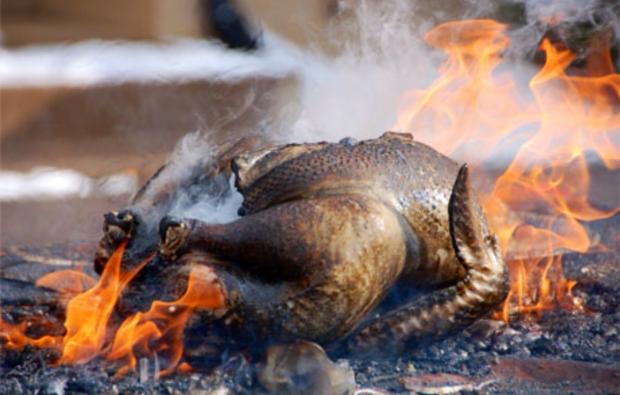 MTFD reminds everyone to be careful this holiday season. Thanksgiving is just days away, and as you're planning your menu, you should also plan how to stay safe in the kitchen. Check out our helpful reminders on staying safe in the kitchen!
MTFD reminds everyone to be careful this holiday season. Thanksgiving is just days away, and as you're planning your menu, you should also plan how to stay safe in the kitchen. Check out our helpful reminders on staying safe in the kitchen!
The makers of deep-fat fryers have a message for ambitious chefs this Thanksgiving: Turkeys don't burn houses down, people do.
As the toward fried — instead of roasted — turkey has grown, so has the concern over the possible dangers of deep-fat fryers.
Allstate Insurance said 15 homes burned to the ground around the country last Thanksgiving as a result of the improper use of turkey fryers. The product-testing company Underwriters Laboratory Inc. refuses to certify as safe any turkey fryer model currently on the market.
In 1999, the last year figures were available, the National Fire Protection Association reported that 500 fires involving a deep-fat fryer took place around the nation, resulting in over $6.8 million dollars in damage.
But defenders say the fryers are as safe as any appliance, if used properly.
"Anything, if you don't follow the directions, can be unsafe," said Johnny McKinion, general manager of Bayou Classic, which manufactures several deep-fat fryers.
"If you don't follow the directions for driving your car or for a chain saw are you going to get hurt? Sure you are," McKinion said. "But if you follow the directions on all of my cookers, they're as safe as anything else."
And, generally speaking, the Maryland State Fire Marshal's office agrees.
"Just like with any other home appliance, the most important piece of equipment that comes with the fryer are the instructions," said Deputy State Fire Marshal W. Faron Taylor.
"When the instructions are followed, the chances of having a fire or burn injury or both are reduced almost 100 percent," Taylor said. "It is when people do not follow the instructions, do not attend to the cooking, don't set equipment up right or in the right location — it is then that we see problems."
But the instructions alone are not enough of a safeguard, say testers at Underwriters Laboratories.
"The numbers (for turkey-fryer fires) are not going down but going up," said Barbara Guthrie, the director of consumer affairs at Underwriters. "At present, we do not believe that there are any sufficient standards that address the safety concerns."
Guthrie said those concerns begin with 5 gallons of scalding 700-degree grease precariously perched over an open flame. And many fryers are unstable — especially the tripod models — which leads to a high incidence of tipping.
When the oil meets the fire, Guthrie said, the fryers instantly become a "vertical flame thrower."
The Underwriters Web site features a video of a turkey fryer filled with hot oil that overflows. When the grease hits the flame, the fryer turns into a volcano of smoke and fire in just seconds.
"We don't believe the taste is worth risking your home, your life or the life of your children," said Guthrie.
Maryland does not keep fryer-specific data, Taylor said. But he noted that cooking fires and kitchen fires are the No. 1 cause of fire in the state, and on days like Thanksgiving when everyone is in the kitchen — or over the fryer — the problems can greatly increase.
If people insist upon frying up a turkey this Thanksgiving, Underwriters suggests that they always fry outside on a flat surface, always tend to the fryer, don't overfill it and make sure the turkey is completely thawed before immersing it.
McKinion said he doubts folks will stop frying turkeys. It has been a tradition in the South for a long time, he said, and his sales in the West and Northeast have increased in recent years. And he thinks people are discovering that the fryer is not just for Thanksgiving anymore.
"They can also deep fry ham, prime rib and pork loin," he said.
Capital News Service contributed to this report.

